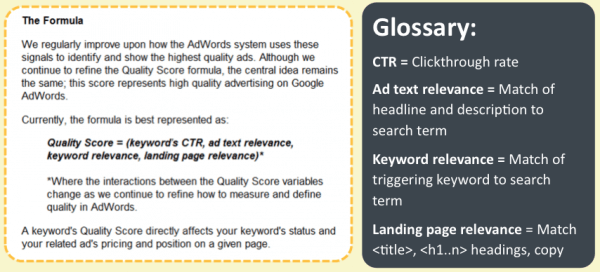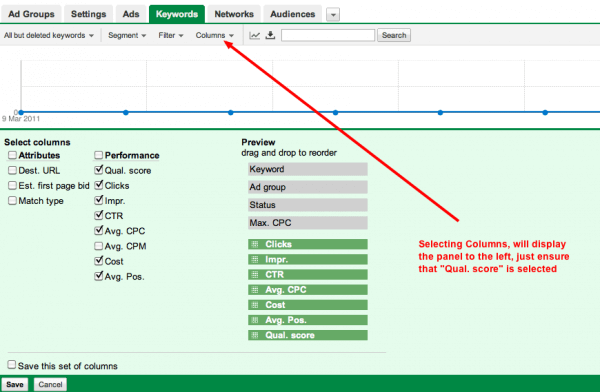Is the Google Adwords Quality Score (QS) relevant to you?
If your company or agency is using any form of PPC then Quality Score is very relevant. If you are managing Adwords hands-on you will know QS well, but marketers working with agencies or specialists need to have an understanding of the Google Quality score. We find it's not always so well known, so is worth flagging up as THE key factor which affects your returns from Google Adwords. Have you asked your agency about the QS distribution for your keywords recently?
Further into the post we'll show you a hidden, secret? formula that Google no publishes but explains it well we think!
The aim of this post is to give a refresher on how Quality Score works, why it is important and how you can improve you current position. Through knowing the fundamentals of Quality Score you can:
- Increase your reach - how many times your ad is viewed by searchers (i.e. increase impression share)
- Increase clicks - better quality scores will lead to higher positions which means more visits!
- Decrease spend - alternatively, you can maintain current positions at a lower cost relative to competitors
How does Quality Score work according to Google?
Google have become more transparent in explaining Quality Score over the years, but I've always felt that they could be more transparent, but they haven't, because it isn't in their interest to be too specific about how it works.
Here is the current definition from Google:
The AdWords system calculates a Quality Score for each of your keywords. It looks at a variety of factors to measure how relevant your keyword is to your ad text and to a user's search query. A keyword's Quality Score updates frequently and is closely related to its performance. In general, a high Quality Score means that your keyword will trigger ads in a higher position and at a lower cost-per-click (CPC).
You can continue reading the current recommendations from Google here >.
If you want the full low-down from their chief economist no less - watch this video from Hal Varian:
https://www.youtube.com/watch?v=PjOHTFRaBWA
The Quality Score formula
This is something that Google no longer publishes, but Dave Chaffey and I think it's a neat way of explaining it. This screen was grabbed by Dave around 5 years ago! But we feel it's a better way of explaining Quality score since it refers to the specific levers within the Adwords account - we've added definitions next to the terms if you're unfamiliar with them. Note though, that there are other factors such as landing page speed are now included which we'll look at below. But the fundamentals are the same.

The one word I constantly stress when discussing Quality Score is - Relevance. The same goes for everything from product through to marketing campaigns. Ads have to be super-relevant to the end user / customer / visitor. The difference with QS is that Google calculates your relevance based on the link between your keywords, the ad-text & ultimately your landing page. After that metrics such as CTR, bounce rate etc come into play. But all hung around that if everything is relevant & joined together then you will receive a high score and therefore it will help boost traffic while lowering costs.
A more recent update to Quality Score is how fast your site performs, a metric those in SEO are now familiar with but a slow website could well result in a lower Quality Score. (See some practical tips on speeding up your website here)
What does Quality Score affect?
At the most extreme level a poor quality score for particular keywords will mean your advert is not even displayed when a relevant search takes place. In short it affects:
- Cost Per Click
- Ad Positioning
- Whether your advert will be show at all
How can I find out my Quality Score?
Quality score operates on a keyword level. There are two primary ways to access this metric, the first is through the Google Adwords Dashboard, navigate into a campaign. When in this view select keywords then columns, ensure "Qual. score" is selected. This will then appear in your dashboard and you will be able to sort by or download this data. The same report can be generated through the Reports section, just ensure you have ticked the appropriate columns.

How do I boost my Quality Score?
The key to boosting your Quality Score lies in the data, you need to first run the appropriate reports to see where you are currently weak. Quality Score is hidden within Adwords by default, so you need to enable it as I've shown above.
These are the implications you should consider:
Implication 1. Clickthrough rates are crucial. Clickthrough rate on the ad is given as the first factor and Google always say this is the primary factor. Higher CTR will result from more relevant ads, so this shows the importance of producing smaller, highly targeted ad groups which deliver creative with relevant ad text and offer for the search term entered.
If you make extensive use of broad match for a limited range of phrases, your clickthrough rates will be lower than if you use exact or phrase match. The use of negative keywords will help increase CTR and so quality score.
Note that the clickthrough rate used takes into account expected clickthrough rate for a particular position since higher ad positions naturally tend to gain higher CTRs. It also doesn’t include the Display or content network which almost always has a lower CTR.
Implication 2. Make sure you have relevant ad text. Ad text relevance is also important. This is degree of match between the words in the ad creative compared to the search term entered. So make sure your descriptions and especially your ad headlines contain the same keywords as the search terms entered by the searcher.
Implication 3. Ensure keyword relevance. You should also make sure you have good Keyword relevance. This is the degree of match between the keyword triggering the ad and the search term entered. As we’ll explain in later sections, you’ll have better keyword relevance if you create more focused Ad groups containing phrase and exact match terms that the searcher uses.
Implication 4. You need to maintain a good history of quality score within your account. The historical assessment of clickthrough rate suggests the importance of removing poorly performing keywords or Ad Groups. High volume brand keywords will have an effect in increasing CTR across the account which won’t occur if brand bidding is not used.
Once you have you set this up, look for the keywords with the highest number of impressions which have the poorest quality score. You then need to understand why you are under performing by reviewing the success factors we have mentioned above. Ask is our ad relevant for the search terms and triggering keywords or is it not directing to a relevant landing page? When you have spotted the issue you can then fix the problem. Some potential fixes are:
- Moving the keyword to a more relevant ad-group so the ads are more relevant (create a new group if necessary)
- Create a new ad or update the ad-text displayed for that particular keyword (as well as ones like it)
- Create a new landing page or updating the current landing page the traffic from the keyword is directed to
Always have in the back of your mind, is the advert or landing page obviously relevant to the keyword, i.e. does it contain the keyword for starters, or versions of! You should also makes changes in such a way that your history is maintained as explained below
Can your account history can impact your Quality Score?
In short yes. Google has always favoured older more active accounts, but also removing & reinstating keywords can erase any score / credibility you have built up. Moving keywords around is fine however so please don't worry about that too much. Check out this blog post for more information on PPC Hero >
Other resources to learn more about Quality Score








